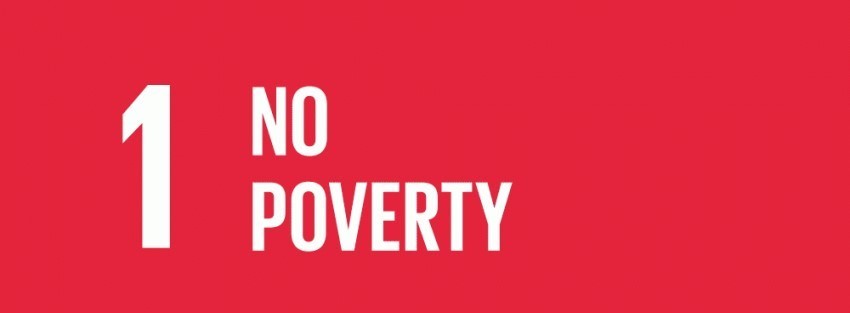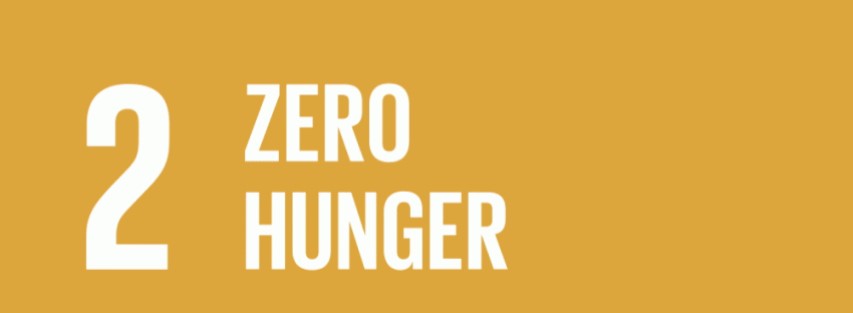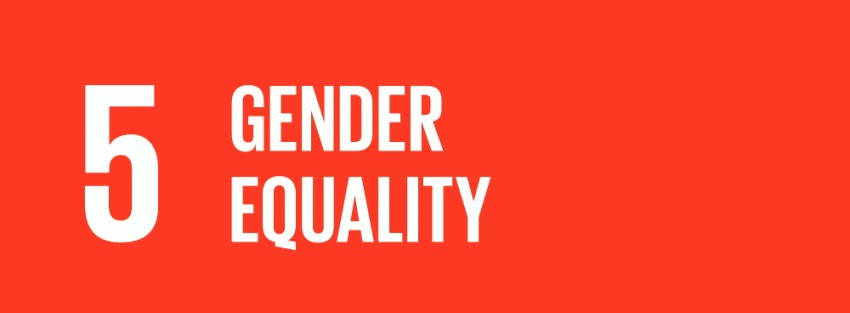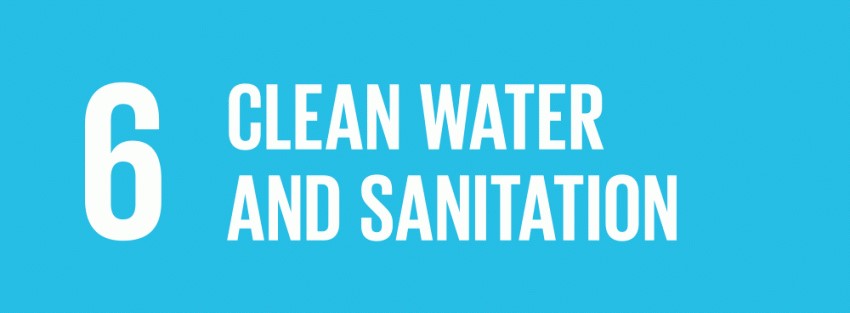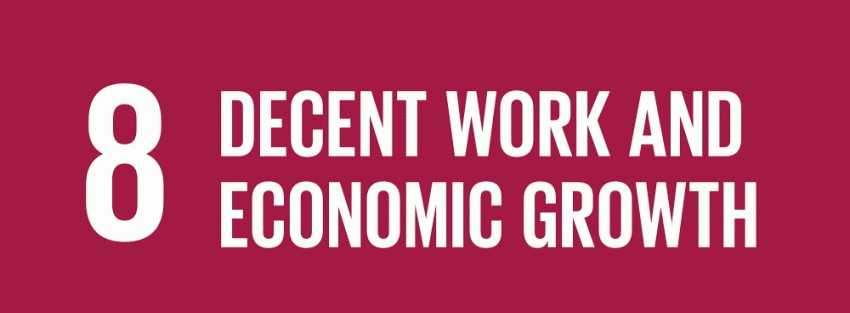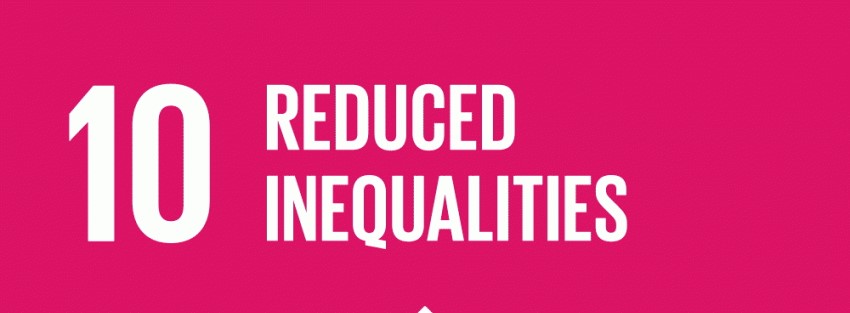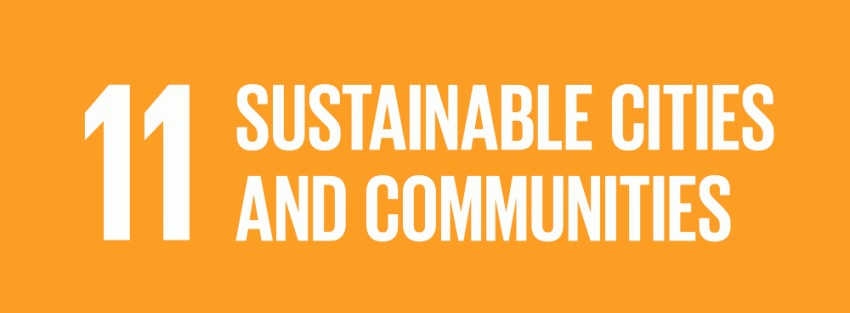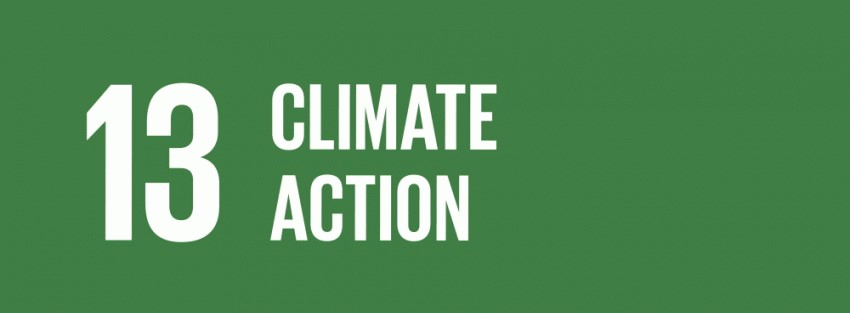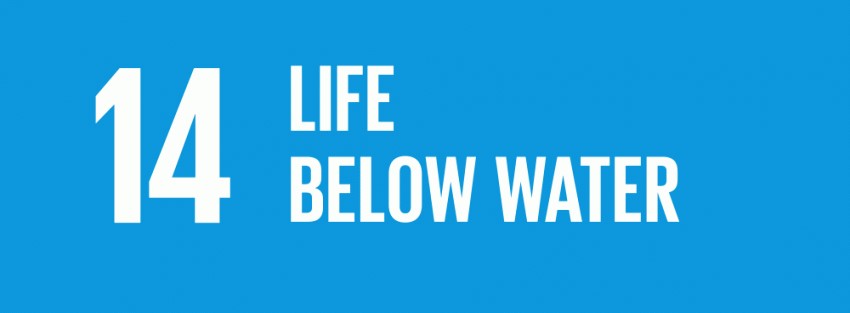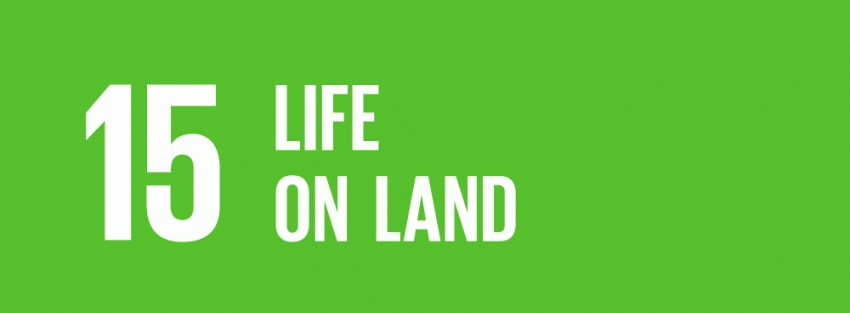SDG 14
Life Below Water
Water supports many lives. Organisms which survive in water are called aquatic organisms. They depend on water for their food, shelter, reproduction and all other life activities.
Sustainable Development Goal 14: Life Below Water in Abu Dhabi
Sustainable Development Goal 14 (SDG 14) focuses on conserving and sustainably using the oceans, seas, and marine resources for sustainable development. In Abu Dhabi, the government is taking proactive measures to protect its marine environments and promote sustainable practices related to marine resources.
Government Initiatives for Life Below Water
Marine Protected Areas: The Abu Dhabi government has established several marine protected areas (MPAs) to safeguard vital ecosystems, such as coral reefs, mangroves, and seagrass beds. These MPAs aim to preserve biodiversity and enhance the resilience of marine habitats.
Sustainable Fishing Practices: Regulations have been implemented to promote sustainable fishing and protect fish stocks. The government monitors fishing activities and enforces quotas to ensure the long-term sustainability of marine resources.
Coastal and Marine Research: The government invests in research initiatives to study marine ecosystems and assess the impacts of human activities. Institutions like the Environment Agency – Abu Dhabi (EAD) conduct research to inform policies and conservation efforts.
Public Awareness Campaigns: Campaigns are conducted to raise awareness about the importance of marine conservation and the threats facing marine environments. These initiatives encourage community engagement in protecting marine ecosystems.
Collaboration with International Bodies: Abu Dhabi participates in international agreements and collaborates with global organizations focused on marine conservation, sharing best practices and resources to address ocean-related challenges.
Abu Dhabi University’s Role in Marine Conservation
Abu Dhabi University (ADU) actively supports SDG 14 through educational programs, research, and community outreach:
Academic Programs: ADU offers programs in environmental science and marine biology that focus on marine ecosystems and conservation strategies. These programs prepare students to understand and address the challenges facing marine environments.
Research Initiatives: Faculty and students engage in research related to marine conservation, water quality, and the impacts of climate change on marine life. This research contributes to the knowledge base needed for effective conservation strategies.
Community Engagement: ADU organizes workshops, seminars, and events aimed at raising awareness about marine conservation and promoting sustainable practices among local communities. These initiatives encourage residents to actively participate in protecting marine resources.
Collaborations and Partnerships: The university collaborates with local government agencies, NGOs, and international organizations to support marine conservation initiatives. These partnerships enhance the impact of both research and community outreach efforts.
Sustainability Practices on Campus: ADU implements sustainability measures within its operations that reflect a commitment to environmental stewardship, including water conservation and waste management practices.
Conclusion
In summary, both the Abu Dhabi government and Abu Dhabi University are dedicated to achieving SDG 14 by taking significant actions to protect marine environments and promote sustainable use of marine resources. Through the establishment
of marine protected areas, sustainable fishing regulations, educational programs, and community engagement, they are addressing the critical challenges facing oceans and marine life. This collaborative effort is essential for ensuring
the health of marine ecosystems in Abu Dhabi and contributing to global marine conservation efforts.
Fieldtrips: From Classroom to Real-World
https://cdn.adu.ac.ae/flipbooks/cohnewsletter/2023-24/index.html#p=14
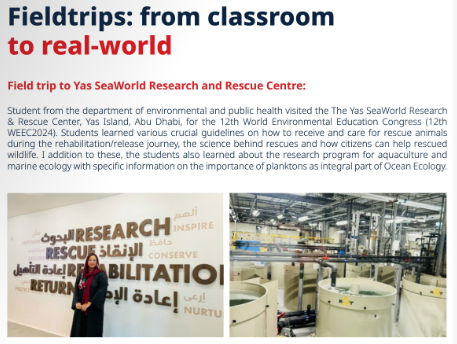
Professional Certificate in Environment and Sustainability
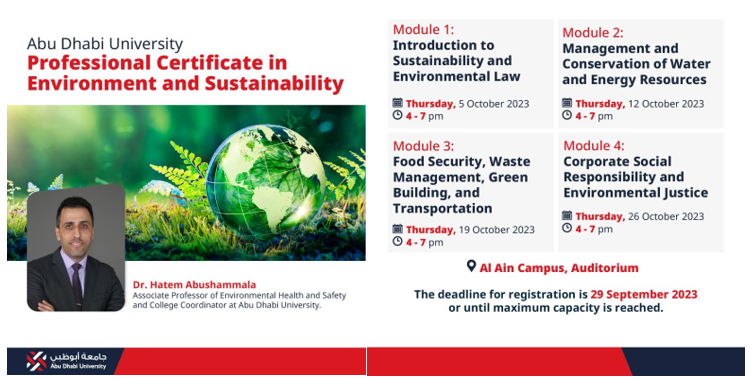
ADU’s Al Ain campus is delighted to announce the ‘Professional Certificate in Environment and Sustainability’ starting in October 2023. Sign up through the link before 29 September 2023 to secure your place. We look forward to welcoming you to this free professional development certificate.
Abu Dhabi University students develop robot to clean sea
https://www.gulftoday.ae/news/2022/02/08/abu-dhabi-university-students-develop-robot-to-clean-sea
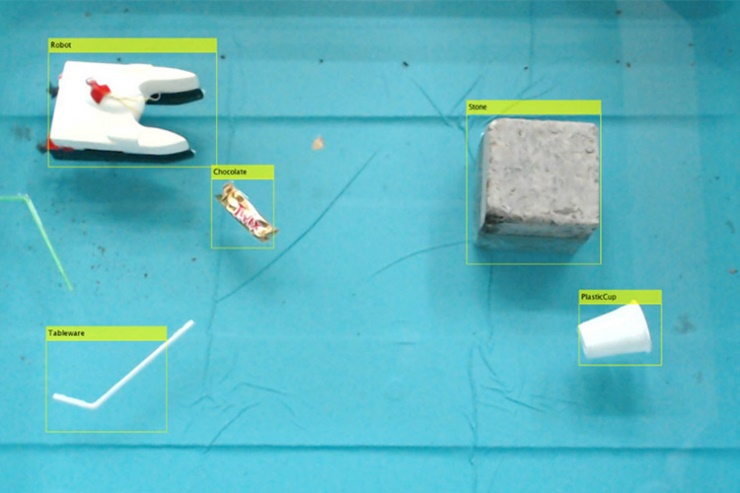
A prototype of the robot developed by students of Abu Dhabi University.
Abdulrahman Saeed, Staff Reporter
Five female students at Abu Dhabi University (ADU), Saba Barfis, Dana Al Manala, Tasneem Al Assaad, Lin Al Asadi, Iman Al Naqbi, under the supervision of Dr Mohammed Ghazal, Dr Anas Al Tarabshah, and engineers Omar Al Ali, Yasmin Al Khalil, Marah Al Halabi, and Maha Yaghi created a robot using artificial intelligence to clean the sea from various types of plastic, floating and mineral waste, which threaten the marine environment.
The new robot is powered entirely by solar energy which is a clean, reliable, and sustainable energy source.
The student, Saba Barfis, explained that the robot works with an autonomous, self-driving and sustainable mechanism for cleaning the sea, as it is specifically designed to clean water surfaces safely and continuously.
Student Dana Al Manala said, "The amount of waste is increasing in the world every year, and human practices affect the land and water surfaces, threatening the marine environment with plastic and other types of floating waste. This endangers marine life and thus humans, as many fish, turtles, and aquatic species die due to eating plastic. Our invention aims to help revive the aquatic environment by purifying it from all kinds of waste floating on its surfaces, in addition, our robot will help people working in the field of cleaning water surfaces by significantly reducing their long working hours.
Student Tasneem Al Assaad explained that the robot is designed to navigate autonomously in a marine environment by studying multiple paths and deciding on the most energy-efficient path based on the number of waste and detected obstacles.
Tasnim added that by using the robot, the entire sea can be cleaned with solar energy, as its battery is charged through an off-grid photovoltaic system upon completion of the cleaning trip.
A DIP controller is also used to ensure that the robot does not deviate from its path, using artificial intelligence, which enables the robot to detect and track waste in the marine environment.
Are Timber and Water Investments Safe-Havens?
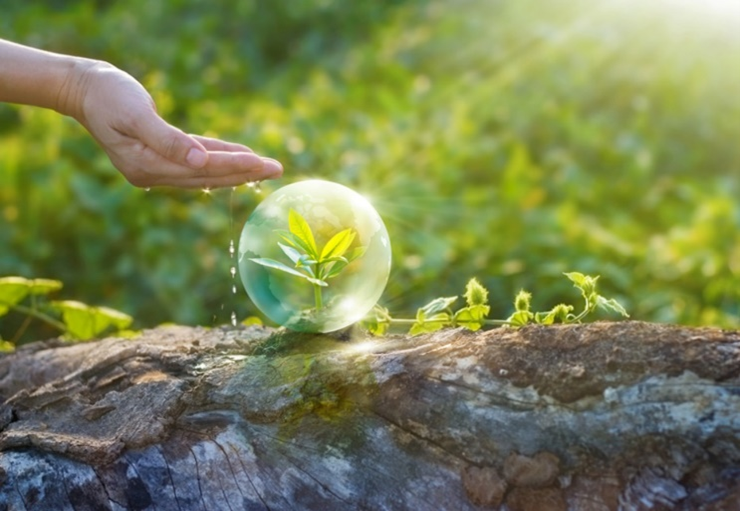
Sustainable finance and the financial aspects of mitigating the effects of climate change are top of the agenda for policymakers, academicians and practitioners. Very often, the media highlight the price of gold and it use as a safe-haven asset during turbulent financial markets and as a hedge against inflation. Recently, natural capital investing has been at the forefront of the economic agenda as it contributes to combating climate change and stimulating environmental awareness. Professor of Finance, Elias Kampouris, in the College of Business, investigated if timber and water were interlinked with other major investment asset classes: equities, bonds, crude oil, gold, real estate, shipping and currency (€/$); and whether they can contribute towards portfolio diversification for investors, and could be used as hedging instruments. The team of researchers investigated this issue for a comprehensive dataset from 2010 to 2021. They find that timber and water can be used as hedging tools for shipping crude oil and bonds, while provide opportunities for investors to diversify their portfolios. Their results also provide important insights over the coronavirus pandemic period on how volatility was transmitted between asset classes, which, collectively, has important implications for investors, and policy-makers.
Reference: Samitas, A., Papathanasiou, S., Koutsokostas, D., and Elias Kampouris (2022) Are timber and water investments safe-havens? A volatility spillover approach and portfolio hedging strategies for investors, Finance Research Letters. https://doi.org/10.1016/j.frl.2021.102657
ADU Signs MoU with Bee’ah to Expand Program Offerings & Training in Environmental Sciences
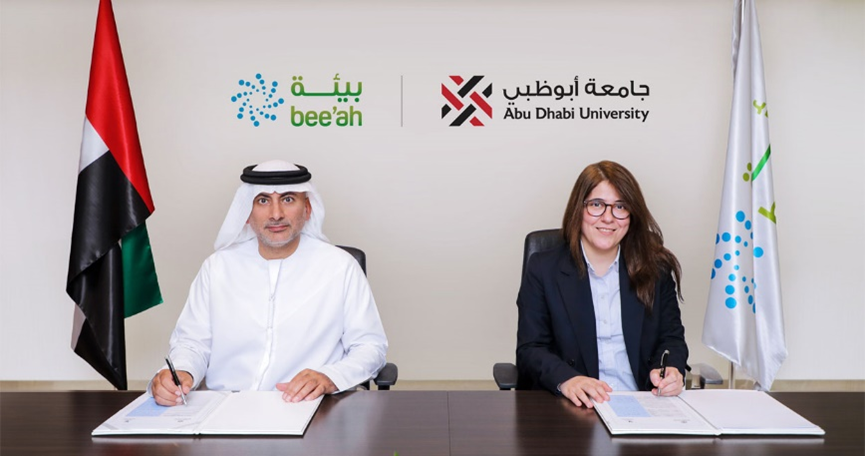
ADU recently signed a Memorandum of Understanding (MoU) with Bee’ah, the Middle East’s sustainability pioneer, to expand its professional course offerings in environmental sciences.
ADU recently signed a Memorandum of Understanding (MoU) with Bee’ah, the Middle East’s sustainability pioneer, to expand its professional course offerings in environmental sciences. Combining ADU’s robust academic framework and Bee’ah’s expertise across sectors relating to sustainability, new courses and training programs will be developed for future-critical topics such as climate change and waste management. In addition to enabling advanced learning opportunities in environmental sciences for one of the largest student bodies in the UAE, the MoU will also enhance academic cooperation and the exchange of scientific expertise between ADU and Bee’ah.
Dr. Nisreen Alwan, Acting Dean of College of Health Sciences at ADU, , and H.E Khaled Al Huraimel, Group CEO of Bee’ah, signed the MoU. The MOU signing ceremony was held in the presence of Mohamed Alhosani, CEO of Bee’ah CRI, Hind Al Huwaidi, Director of Education at Bee’ah, Sami Mohammed Handley, Director of IEMS, Dr. Michele Cherfane, Chair of the Environmental and Public Health Department at ADU, and Dr. Rahaf Ajaj, Assistant Professor of Environmental Health and Safety at ADU. ADU and Bee’ah will now begin collaborative development of the new programs, enabling the academic and professional development of students, while also being accessible to organizations looking to advance research in the environmental field.
ADU and Bee’ah will work together to organize events that will promote environmental awareness among students and in communities, while also attending sustainability seminars and conferences to contribute to the global dialogue on sustainability.
Professor Waqar Ahmad, Chancellor of ADU, said: “We are delighted to collaborate with Bee’ah to educate and raise awareness on tackling environmental issues for a more sustainable future. We look forward to developing a framework to advance research on resource management, climate change, and waste, in order to find better solutions that contribute to environmental sustainability. At ADU, we believe that preserving the environment is a noble mission, one that we feel is important to adopt as a leading university in the MENA region.”
Professor Waqar added: “ADU strives to involve its students in devising innovative solutions to the most pressing world problems and encourage them to be more involved in the measures being taken to protect the environment. We look forward to empowering our students to innovate in this field by providing them with the necessary knowledge, trainings and workshops that allow them to build the foundation for their future career path. ADU aims to educate the leaders of tomorrow by fully supporting students and graduates in their career choices through partnerships and agreements that support students in finding jobs and building sustainable and successful careers.”
H.E. Khaled Al Huraimel the Group Chief Executive officer in Bee’ah said: “By partnering with Abu Dhabi University, we are sharing our expertise with the next generation of academics and professionals, who will be critical in carrying forward the vision of an environmentally sustainable future in the UAE, Middle East and beyond. Through the programs we develop, ADU and Bee’ah will enable a wider national and global discourse on the threats facing our environment, while accelerating the advancements to tackle these very threats.”
ADU aims to become a leading university in the MENA region by participating in leading innovative projects and solutions. With the strong partnerships formed with entities that focus on environmental sustainability, backed by the
prominent courses it provides in the field of Environmental Health and Safety, ADU is ensuring new talents that excel in sustainability, waste management and pollution monitoring.
ADU Students Develop Litter-Hunting Sea Robot
Students in the UAE are developing a state-of-the-art floating robot in an effort to help clean up the world’s oceans. Researchers at Abu Dhabi University (ADU) have created an autonomous prototype which works in conjunction with an airborne drone.
The team of developers at Abu Dhabi University.
Students in the UAE are developing a state-of-the-art floating robot in an effort to help clean up the world’s oceans.
Researchers at Abu Dhabi University (ADU) have created an autonomous prototype which works in conjunction with an airborne drone.
The drone scans the sea’s surface from above, identifying areas of dense marine litter that might include plastic bottles or discarded fishing nets.
It then relays the location of the debris to the solar-powered robot, which sets a course to the area before deploying a large net to collect it.
Speaking to The National, Dr Mohammed Ghazal, an ADU associate professor and the project’s coordinator, said the technology could prove invaluable in the fight against growing marine pollution.
Scientists estimate there is currently 150 million tonnes of plastic floating in the world’s oceans, causing huge damage to marine life.
“There are other solutions to this particular problem but it seems the efforts are always manual – people riding in boats to pick this [litter] up,” Dr Ghazal said.
“It doesn’t feel like a very sustainable solution. We’re delighted with the progress we’ve made so far. We can see that we’re onto something.”
Known as the IntelliSeaCleaner, the 20cm by 15cm floating prototype has been designed and built at ADU using 3D printer technology.
The collaborative system works by first deploying a drone to capture aerial video of the sea’s surface for analysis by the robot.
Once suspected patches of debris are identified, the vessel charts a course to its location before deploying a wide drag net to capture the rubbish. Similar technology could also be used to clean up oil spills.
To date, the miniature model has only been tested in laboratory conditions, with developers still uncertain about how it will function in open water.
“This [project] has forced us to look at many perspectives – energy, path planning and machine learning,” said Dr Ghazal.
“We have a prototype and we’re able to drive it remotely, but we’re finding there’s a problem with wind and waves which affects the control.”
The research team revealed the project’s drone had recently been sent to the University of Louisville in Kentucky, United States, for flight tests.
Next month, additional teams will begin building a full-size version of the model, with developers aiming to complete the second prototype within a year.
However, the UAE students admit significant technical hurdles to the project have yet to be overcome.
How to ensure control in choppy seas is one major issue, with how to empty a full net most efficiently being another.
The students are currently planning on rerouting the vessel to land to dump its collected waste or to a nearby, larger vessel.
“What we didn’t anticipate is that everything in the sea is tougher than lab conditions,” said Dr Ghazal. “We’ll need to focus on this.”
As well as Dr Ghazal, other ADU academics involved in the project include systems experts Dr Anas Al Tarabsheh and Dr Mohammad Al Khedher.
Among the ADU students involved are Dana Al Manla, Tasnim Al As’ad, Leen Al Assadi, Eiman Al Naqbi, Yasmina Al Khalil and Omar Al Ali.
News Courtesy: https://www.thenational.ae/uae/science/uae-students-develop-litter-hunting-sea-robot-1.894809
Field trip to the Sustainable Eco-Villa
DU students enrolled in the Natural Resources and Sustainability courses participated in an educational field trip to the sustainable Eco-Villa in Masdar City organized by Dr. Nida Qafisheh, Coordinator of the EHS program, and Dr. Manar Mfarrej.
ADU students enrolled in the Natural Resources and Sustainability courses participated in an educational field trip to the sustainable Eco-Villa in Masdar City organized by Dr. Nida Qafisheh, Coordinator of the EHS program, and Dr. Manar Mfarrej. The Eco-Villa was launched in 2017 in support of Abu Dhabi sustainability week and in collaboration with Madar Farms.
The students learned how to promote sustainable living through the use of technology designed to save energy and water, as well as practical waste management techniques. The technology included Aero Springs Garden and Greenoponics that are used to grow plants and Zero Mass Water, a smart off-grid panel powered by solar energy that produces around four litres of drinking water per day.
Environmental Health & Safety Students Participate in Eco Waste During Abu Dhabi Sustainability Week
ADU Environmental Health & Safety (EHS) students were proud to present their innovative project in collaboration with TADWEER at the EcoWaste Exhibition, part of Abu Dhabi Sustainability Week.
ADU Environmental Health & Safety (EHS) students were proud to present their innovative project in collaboration with TADWEER at the EcoWaste Exhibition, part of Abu Dhabi Sustainability Week. EcoWaste is a platform to optimize waste management and introduce new technology to convert waste into energy. The students were supervised by Dr. Nida Qafisheh, Coordinator of the EHS program, and Dr. Manar Mfarrej, Assistant Professor.
Abu Dhabi Sustainability Week (ADSW) showcases the UAE’s proactive, forward thinking approach to sustainability and brings together a unique mix of policy makers, industry specialists, technology pioneers and the next generation
of sustainability leaders. Through its initiatives and events, ADSW helps drive knowledge sharing, implementation of strategies, and delivery of solutions to drive human progress.
ADU’s BGS Honor Society Host Guest Speakers from Environment Agency & Etisalat
Abu Dhabi University’s Beta Gamma Sigma Honor Society hosted Monir Salem Bou Ghanem from the Integrated Environment Policy & Planning Agency to speak about ‘Sustainability, Green Economy and Economic Growth in the UAE’.
Abu Dhabi University’s Beta Gamma Sigma Honor Society hosted Monir Salem Bou Ghanem from the Integrated Environment Policy & Planning Agency to speak about ‘Sustainability, Green Economy and Economic Growth in the UAE’. The presentation focused on the need for a change in the mindset of humans to clean up the environment. The Honor Society also hosted Dr. Guna Rethinam, Director of Organization Design at Etisalat, as part of its Guest Speaker series. His presentation discussed the duopoly of the UAE’s telecom sector, national artificial intelligence strategies, and the evolution of the telecom sector.
Mr. Monir discussed Abu Dhabi’s role in promoting sustainable development through local and international events such as Expo 2020. He used graphics to represent the journey from 2017 until 2021 to showcase the UAE’s
environmental achievements. One of the most powerful moments of the speech was when he conducted a test about people’s awareness of the plastic problem. The audience was shocked by the example of 13 million tonnes of plastic
entering the world’s oceans every year. ADU students asked many questions about how to raise more awareness and help solve these environmental problems.
Dr. Guna pointed out that the UAE’s telecom sector has developed into a market sharing economy, with several providers in the market including Etisalat, Du, and Virgin. This brings many benefits to customers including improved
service, price advantages, and a greater brand selection. By providing insights into how regulators have expanded their roles from core regulation to e-Enablement, Dr. Guna urged the audience to remain open to change in the strategies
developed to transform the economy in the long term. e-Enablement supports improvements in public services such as eHealth, eEducation, and eGovernment.
Sustainable Development Goals (SDGs)
Abu Dhabi University is committed to becoming the best institution of its kind in the region. We are a private, multi-campus university committed to meeting the education, skills and knowledge needs in the United Arab Emirates and neighbouring countries through qualifications and standards that are respected across the world.
01
No Poverty
Sustained economic growth cannot be achieved without social inclusion as the whole of society has a role to play in the development of a country. Federal Law No. 13 of 1972 and its amendments by the law (No.2) in 2001 was issued by the Ministry of Community Development.
Introduction
Sustained economic growth cannot be achieved without social inclusion as the whole of society has a role to play in the development of a country. Federal Law No. 13 of 1972 and its amendments by the law (No.2) in 2001 was issued by the Ministry of Community Development.
(MOCD) as the first law to provide social benefits to members of the community to ensure and sustain the high quality of living for all UAE citizens. The Ministry continues to work today on enhancing social inclusion for all members of society where social benefits are extended to cover twenty-one segments of the community.
The UAE government has a future vision to change the culture of social support from the current ‘social welfare’ model to ‘sustainable social development’ that encourages independence and growth of families across the UAE.
ADU is determined to overcome all challenges that ADU and our students might face as a result of the poverty. We continue to be dedicated to empowering and inspiring outstanding students to pursue their goals. Our scholarships and financial aid programs are available to all students who want to fund their academic programmes. We consider it our duty to provide equal opportunities to students interested in pursuing higher education, enabling them to contribute to society regardless of their financial situation.
In additional to financial aid, ADU scholarships are being provided to outstanding students, through seven main categories, including the Sheikh Hamdan Bin Zayed Scholarship, the President’s Scholarship, the University Scholarship, the Academic Scholarship, the Athletic Scholarship, the Alumni Scholarship, and the Family Tuition Waiver.
We take pride in attracting the brightest students in the UAE and offer them generous support, to excel in their studies. Our Scholarship and Financial Aid programmes are part of ADU’s corporate social responsibility and are influenced by the UAE’s great leadership. ADU is constantly finding pioneering and innovative ways to support and facilitate the needs of our students to help them achieve their academic degree.
Emirates Red Crescent and ADU Launch a Humanitarian Funding Campaign
Emirates Red Crescent and Abu Dhabi University recently launched the Education Support Campaign in coordination with Abu Dhabi Cooperative Society and Lulu Group International. Through this collaboration, ADU and Emirates Red Crescent will support disadvantaged students in their university studies, providing them with an opportunity for a successful educational journey. The campaign aims to raise 10 million dirhams, and students will benefit from these funds starting 24 November 2021 and for one year. (This activity is licensed by the Department of Community Development – Abu Dhabi, permit number 022).
Abu Dhabi Cooperative Society and Lulu Group International will aid the campaign by facilitating donations through their different points of sale. Community members will show their solidarity by donating valuable aid to students, starting at two dirhams.
Public donations will be accepted via text message through Etisalat and Du. Bank donations can be sent to Sharjah Islamic Bank - account number (11445518006), IBAN (AE350410000011445518006). Individuals can also donate through the link provided on the Emirates Red Crescent website (https://www.emiratesrc.ae/eduadu), with the donations ranging from ten dirhams to 1,000 dirhams.
H.E. Salem Al Rayes Al Ameri, Deputy Secretary-General for Local Affairs at Emirates Red Crescent, said, "Sponsoring students is one of the permanent and continuous programs within the initiatives of the Humanitarian and Development Authority. We continue to witness a high rate of response and generosity from sponsors and benefactors. These donations are considered a true embodiment and reflection of the authority's efforts to invest in empowering individuals and guiding them towards achieving their aspirations and fulfilling their dreams."
Al Ameri added, "The Authority acknowledges the important role it plays in preparing future generations for the responsibilities of tomorrow."
Al Ameri praised the existing cooperation between the Emirates Red Crescent and Abu Dhabi University, which seeks to support education and provide opportunities to disadvantaged students whose family circumstances prevent them from continuing their educational path. The cooperation embodies Abu Dhabi University's commitment to fulfilling its social responsibility, as well as its leading academic role in advancing science and education as the most important pillars of human development in the country. He also praised the role of the Abu Dhabi Cooperative Society and Lulu International Group in supporting the activities of the campaign.
Salem Mubarak Al Dhaheri, Executive Director of Community Relations at Abu Dhabi University, said, "Abu Dhabi University is proud of its strategic partnership with Emirates Red Crescent in launching the Education Support Campaign. The campaign aligns with Abu Dhabi University's mission to support students and allows us to share social responsibilities with the community. We are proud of the continuous cooperation and renewed partnership with Emirates Red Crescent in launching campaigns that carry a noble message and achieve a tangible and real impact on our society."
Al Dhaheri added, "Abu Dhabi University appreciates the role of the Abu Dhabi Cooperative Society, Lulu International Group, and all participating partners in supporting the campaign activities. Investing in our young people and building an educated generation capable of leading the continued development of our country is vital."
Abdul Majeed Al Khouri, the Executive Director of the Abu Dhabi Cooperative Society, commented, "Our participation in the Education Support Campaign confirms the depth of the decades-old relationship between the Abu Dhabi Cooperative Society and Emirates Red Crescent. With God's grace, it has gone beyond humanitarian work and now encompasses sustainability. We are proud of this pioneering partnership. The Abu Dhabi Cooperative Society has always sought to serve the community of the UAE and we continuously contribute to helping and supporting various sectors in Abu Dhabi and the other Emirates."
Al Khoori added, "The initiatives adopted by the Abu Dhabi Cooperative Society reflect our passion towards aiding societal struggles related to education. Abu Dhabi Cooperative Society has initiated partnerships with ministries and governmental institutions, such as the Ministry of Social Affairs and the Emirates Red Crescent, to create opportunities for those who dream of pursuing their educational journey. In the last few years, we doubled our efforts and developed initiatives that will allow us to serve our country and consolidate the concept of social responsibility. We are proud to be part of an institution that provides its students with an environment that values charitable work and social development while simultaneously providing high-quality education and academic qualifications that are respected worldwide."
Mr. Aboobakker TP, Director of LuLu Hypermarkets Abu Dhabi and Al Dhafra region, said, "This initiative embodies the belief and commitment of LuLu Group in the bright future of the UAE and the power of the Emirati youth to shape it."
"Education is one of the strongest building blocks for a nation's future, and LuLu Group is honored to share in raising valuable funding for needy students," he continued. "It empowers Emirati youth to contribute to their best potential and lead the future of the country. It is particularly timely that this campaign comes on the eve of the 50th anniversary of the UAE's nationhood. We at LuLu Group International are proud of our identity as a 'homegrown' UAE brand and see this participation in the 'Let's Support Their Future' campaign as our humble contribution to the nation that gave us so much to build upon."
Sustainable Development Goals (SDGs)
Abu Dhabi University is committed to becoming the best institution of its kind in the region. We are a private, multi-campus university committed to meeting the education, skills and knowledge needs in the United Arab Emirates and neighbouring countries through qualifications and standards that are respected across the world.

